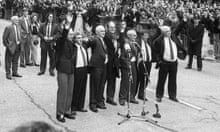West Midlands police have asked a judge to exclude reporters from a hearing in which they will attempt to force a journalist and former MP who exposed the Birmingham Six’s wrongful conviction to reveal his source material.
The force have applied for an order under the Terrorism Act 2000 compelling Chris Mullin to hand over material, including notebooks, from his 1985-86 investigation into the 1974 Birmingham pub bombings, which killed 21 people and injured more than 200.
The Birmingham Six were jailed for life in 1975 but their convictions were quashed in 1991, five years after the publication of Mullin’s book Error of Judgement: the Truth About the Birmingham Bombings.
In 2018, West Midlands police announced a decision to reinvestigate the case. Officers believe Mullin has interviews that could confirm the identity of a surviving member of the IRA gang now thought to be behind the pub bombings. Relatives of victims of the bombings have criticised the former MP for refusing to disclose the names of living suspects.
Journalists are professionally bound to maintain the confidentiality of sources and Mullin is refusing to disclose the requested material on the basis that it would represent a fundamental breach of this principle. The National Union of Journalists is supporting his case.
West Midlands police confirmed on Tuesday that they had made submissions asking for Friday’s hearing at the Old Bailey to be held in private. They cited the need to protect the privacy of a suspect whose name may be mentioned in court who has not been charged, in line with the decision in the recent Bloomberg case at the supreme court which protects such suspects.
News organisations including the Guardian, Daily Mail and Times plan to challenge the attempt to have the public, including journalists, excluded from the entirety of the hearing. The Guardian understands that Mullin wishes for the hearing to be held in public.
Many reporters have risked jail for contempt of court in the past rather than reveal sources. In a significant 1996 case, the European court of human rights backed a journalist from the Engineer magazine, Bill Goodwin, after a court in Britain tried to force him to reveal a source. However, in some decisions since the Goodwin case, judges have ruled that the need for disclosure outweighed the public interest in a journalist being entitled to protect their sources.









